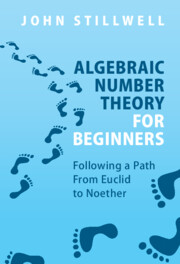5 - Ideals
Published online by Cambridge University Press: 28 July 2022
Summary
In the ring of integers of an algebraic number field, the obvious idea of "prime" is unsatisfactory, because "unique prime factorization" sometimes fails. This led Kummer to postulate the existence of "ideal numbers" outside the field, among which are "ideal primes" that restore unique prime factorization. Dedekind found that "ideal numbers" could be modeled by certain sets of actual numbers that he called ideals. In this chapter we give some concrete examples of ideals, then develop basic ideal theory, first in general rings, then in rings satisfying the ascending chain condition (ACC). ACC was identified by Emmy Noether as a key property of the rings studied by Dedekind, and shown by him to enjoy unique prime ideal factorization.
- Type
- Chapter
- Information
- Algebraic Number Theory for BeginnersFollowing a Path From Euclid to Noether, pp. 104 - 125Publisher: Cambridge University PressPrint publication year: 2022

